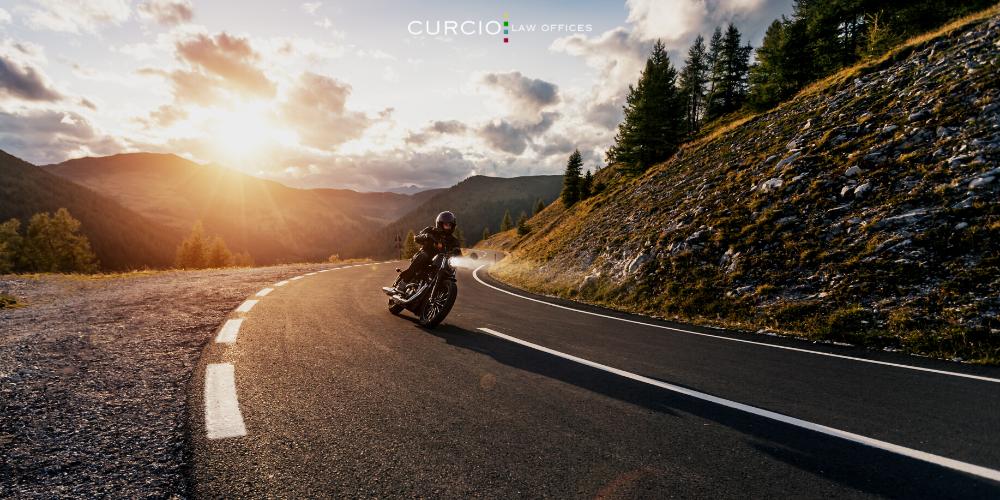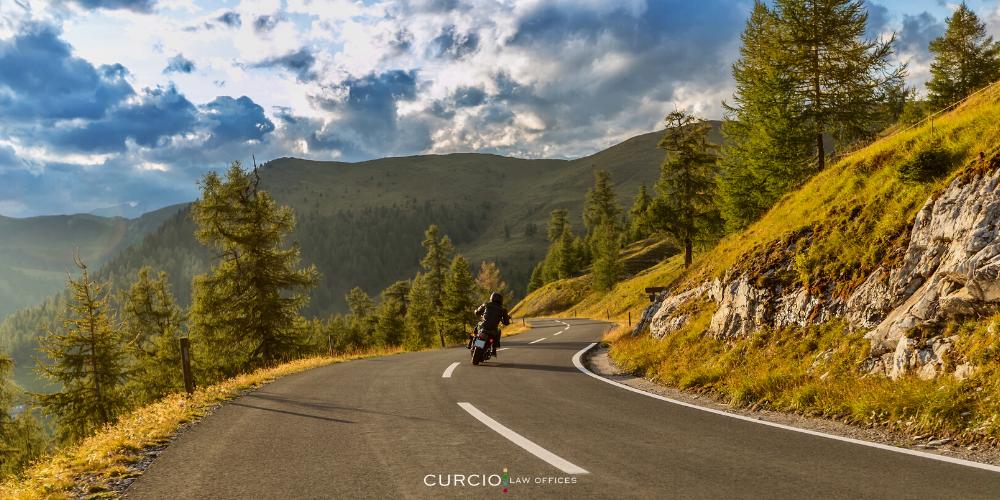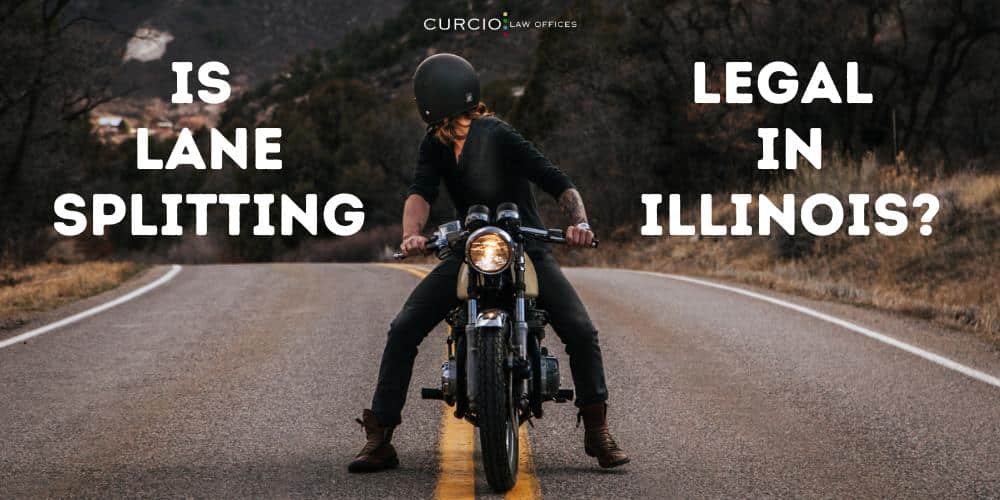Motorcycles are notorious for carrying an increased risk of injury in a traffic accident. One of the most prominent reasons that motorcycles are more susceptible to giving their riders severe injuries than other vehicles is that they are not enclosed spaces.
The dangers associated with driving a motorcycle are well-documented and should give cyclists enough reason to exercise extreme caution when riding one. This means that they should avoid practices such as lane splitting as much as possible. It is a dangerous maneuver and illegal according to Illinois law.
If you or a loved one were involved in a lane-splitting or motorcycle accident, our team of experienced Chicago motorcycle accident attorneys at Curcio & Casciato is committed to helping you navigate this stressful time. Your family may be entitled to compensation for any injuries sustained in a traffic accident.
Our team helps clients get optimal compensation for the physical, financial, and emotional injuries caused by Illinois motorcycle crashes. Call us today at 312-321-1111 for a free consultation.
What is Lane Splitting?
Lane splitting – also known as stripe-riding – is when a cyclist maneuvers between two lanes of vehicles. It is a common practice when a rider wants to save time or bypass slow-moving traffic. In more urban or downtown environments with a higher density of slow traffic, lane-splitting is a common sight.
The Difference Between Lane Splitting, Lane Filtering, and Lane Sharing
Lane splitting is the act of weaving through – usually congested – traffic. Rather than driving within the marked lanes and passing vehicles, this act is characterized by the cyclists driving between the two lanes.
Lane sharing is a cooperative endeavor between two vehicles side-by-side riding in the same direction. It involves one vehicle allowing a motorcycle rider to share an inner lane with them, rather than ride the split lanes. This is effective at making sure that motorcycle riders can flow through stopped traffic without breaking the speed limit.
Lane filtering is a significantly more dangerous version of lane sharing that involves motorcyclists weaving in and out of openings in adjacent lines and vehicles simultaneously. This is performed when lanes of traffic flow are congested and motorcyclists want to advance through non-motorcycle drivers as quickly as possible.
How Common is Lane Splitting?
The practice of lane splitting is most common in urban or city environments where there will be a higher density of traffic congestion. Heavy traffic is the main cause that motorcyclists resort to breaking lane splitting laws for the vast majority of the time.
However, even though it is a considerably common sight in areas with larger population densities, the practice of the maneuver is still in violation of Illinois lane splitting laws.

Is Lane Splitting Legal in Illinois?
Illinois law does explicitly mention lane splitting as an illegal act. Illinois statute 625 ILCS 5/11-703 states:
“The driver of a 2 wheeled vehicle may not, in passing upon the left of any vehicle proceeding in the same direction, pass upon the right of any vehicle proceeding in the same direction unless there is an unobstructed lane of traffic available to permit such passing maneuver safely.”
Which States Legalize Lane Splitting?
California was the first state to legalize lane splitting in its traffic laws. This means that lane splitting punishments will not be enforced by the California Highway Patrol. Some states have less strict versions of the lane splitting law, such as setting the maximum speed for lane splitting at 20 miles per hour.
California is not the only state that does not prohibit motorcyclists from lane splitting or lane filtering. Arizona was the third state to make lane splitting legal, therefore motorcyclists will not face any potential jail time for riding between adjacent lanes.
Pros and Cons of Lane Splitting
In terms of the pros and cons of lane splitting, it depends on where the motorcyclists are performing this act. In the state of Illinois, lane splitting is in direct violation of lane splitting laws, so the practical benefit of it might not be as great as in other states.
However, there are many factors that a motorcyclist might consider before risking their own safety and a potential police report by lane splitting. The pros to consider are practical convenience, safety awareness, and speed limit. The general list of cons is safety risks, awareness of the other driver, and unpredictable road behavior. Motorcyclists may also be held responsible for any accidents while lane splitting or filtering.
Pros
There are some practical conveniences that lane splitting provides for motorcycles and vehicles. When a motorcyclist is splitting lanes, they are actively contributing to alleviating stopped traffic. If all motorcyclists conformed to the same lane structure as other vehicles, there might be significantly more traffic in urban environments. Some countries’ road infrastructure even relies on this practice to properly flow traffic.
On average, motorcyclists that engage in lane splitting and lane filtering are often more spatially aware and experienced than motorcyclists that reside within the lanes. For motorcycles to comfortably and consistently weave between two vehicles without causing an accident, the motorcyclist is most likely very experienced and trained.
According to a study conducted by the University of California Berkeley, lane splitting becomes relatively safer if everyone is conforming to a uniform speed limit. If the universal speed limit of all vehicles on a given set of lanes is 50 miles per hour, it is relatively safe for motorcyclists to lane split if they are not going more than 15 miles per hour faster than other vehicles.
Cons
One of the most fundamental dangers of engaging in a lane split is the inherent risk it puts on everyone involved. Lane splitting riders are choosing to operate out of the standard rules of the road and the lanes. There are many factors involved in operating a vehicle that makes the legal status of lane splitting a point of contention. If lane splitting riders – or others on the road – make any mistakes, it can lead to serious bodily injury. This extremely dangerous unpredictability is what makes lane splitting illegal in most states.
One of the most volatile parts of driving can be the reliance one driver has to have on another. That is why – no matter how trained individual motorcycle riders are – they can never account for everyone around them to be as astute as them. Many drivers are not conditioned to be on the lookout for motorcyclists.
It is impossible for people on motorcycles to know the type of drivers they will encounter in the same lane. People in cars most likely do not understand what lane splitting and lane filtering are, and they especially do not know whether the maneuvers are explicitly legal or illegal. That is why – when a motorcycle drives between lanes – the rider should always be on the lookout for aggressive behavior from other cars.
What To Do After a Lane Splitting Accident in Illinois
If you or a loved one got into a motorcycle accident, then you should seek medical attention immediately. The next step in the process will be to seek legal guidance from an experienced team of Illinois lane splitting and Chicago personal injury attorneys. Our team at Curcio & Casciato is ready to defend you or your family and make sure that you receive the maximum amount of compensation possible.
Due to lane splitting laws in Illinois prohibiting the maneuver, the burden of proof is on the rider in a motorcycle accident. The lane splitting and lane filtering legal status is enforced considerably in this state, and those not at fault for the accident are not liable to prove any fault.
Call 911
Immediately following a motorcycle accident, you should always seek medical attention and stabilize everyone’s condition. A motorcycle accident has the same potential for harm as any other accident involving cars.
Gather Evidence
Illinois law explicitly states that lane splitting is illegal. Therefore, if a motorcycle crash occurs due to a lane splitting incident then the burden of proof is on the cyclist. Still, all parties involved in the accident should take pictures/videos of the scene and their injuries. Once the police and EMT’s arrive at the scene, they will create official reports of the accident, which either party could use to their advantage later. It’s also recommended to write down the specific details of the accident as soon as you can. Human memory is unreliable, especially after a traumatic accident. Documenting the details immediately can protect you later, if a personal injury lawsuit does crop up.
Contact Your Insurance Company
After being involved in a motorcycle accident, the last thing you would want is to worry about potential medical expenses or increased insurance rates. It is important to contact your respective insurance provider to make sure you will be able to recover financially from the motorcycle accident.
Contact a Chicago Motorcycle Accident Lawyer
A motorcycle accident can be a life-altering experience for all parties involved. The injuries and medical expenses incurred from the tragedy can be a heavy burden to bear for the victim and their families.
A Chicago catastrophic injury attorney can not undo the damage from the accident, however, they can help ease the burden placed on your family. Our legal team at Curcio & Casciato can help you determine if you have a case and help you recover damages for your catastrophic injuries.
Can I Sue if I Got Into an Accident With a Motorcyclist Who Was Lane Splitting?
If you or a loved one suffered major injuries or death due to a motorcycle accident, then you have grounds to take legal action. As stated previously, Illinois law does specifically address lane splitting – it’s illegal. Therefore, if you were involved in an accident with a cyclist that was lane splitting, they can be held liable for the damages.
Whether you were rear-ended or you endured bodily harm, you may be entitled to significant compensation from the guilty party. Lane splitting law – in a vast majority of states – takes a clear stance against the practice, and that is why you may have a strong case.
Lane splitting laws also state that the statute for limitations in the state of Illinois is two years. This means that victims have two years to file a personal injury claim after the motorcycle accident happened. If a claim is not filed within that time frame, then the potential for a case may be forfeited and the victims will not be able to receive financial compensation.
If you’re questioning: what is a rear-ended collision settlement? Or how much compensation can I receive for my motorcycle accident claim? It’s crucial to reach out to Curcio & Casciato for answers, strong legal representation, and a speedy resolution to your case.
Damages for Motorcycle Accidents
Damages for motorcycle accidents vary depending on a number of circumstances. The financial compensation that you are owed is contingent on the extent of the losses sustained, expenses incurred, lost wages, and the severity of bodily harm.
Illinois is not a state that has made lane splitting legal, therefore, there is a lot less leniency on the side of the lane splitting rider. If you were rear-ended by one of these cyclists and sustained bodily harm, then you have the potential to receive considerable damages in accordance with the lane splitting legal status.

Call Chicago Motorcycle Accident Lawyers at Curcio & Casciato Today
A motorcycle accident carries just as much risk to the well-being of you and your loved ones as a normal automobile accident. An accident with a negligent motorcycle rider can take a heavy toll in the form of severe bodily harm, medical expenses, or lost income. Whether you are a motorcyclist or another driver, you deserve to be compensated for your accident.
Our team of attorneys wants to help your family get back to normal life as quickly as possible. If you or a member of your family were involved in a motorcycle accident, please contact Chicago motorcycle accident attorneys at Curcio Law today. Call us today at 312-321-1111 for a free consultation.



